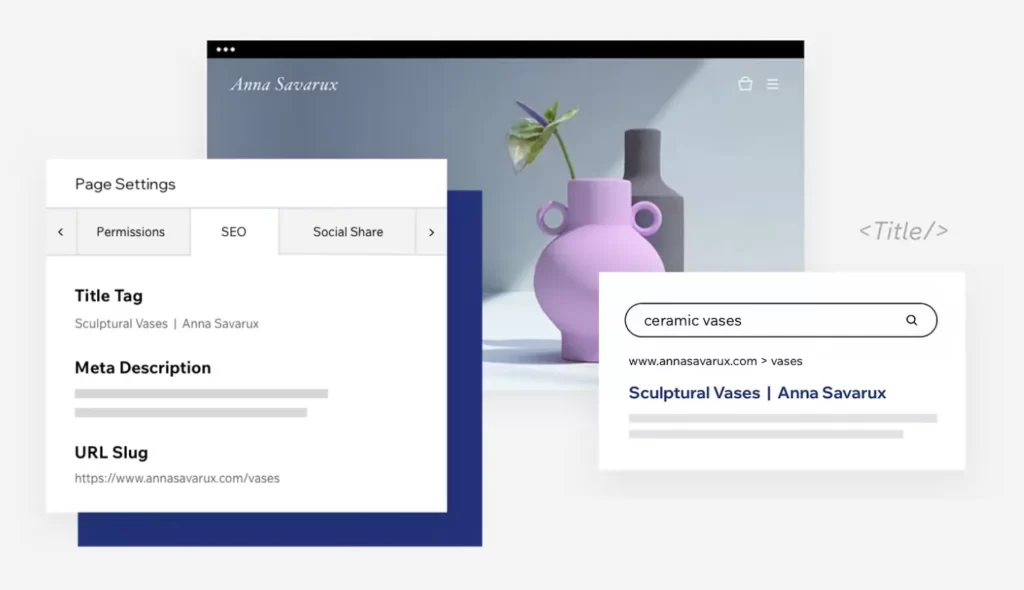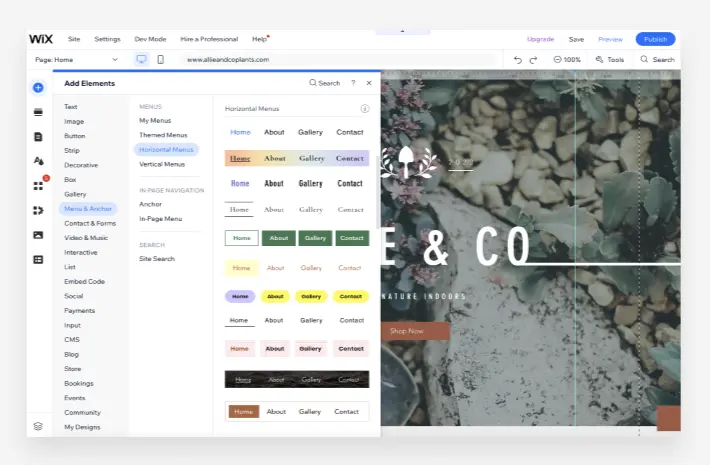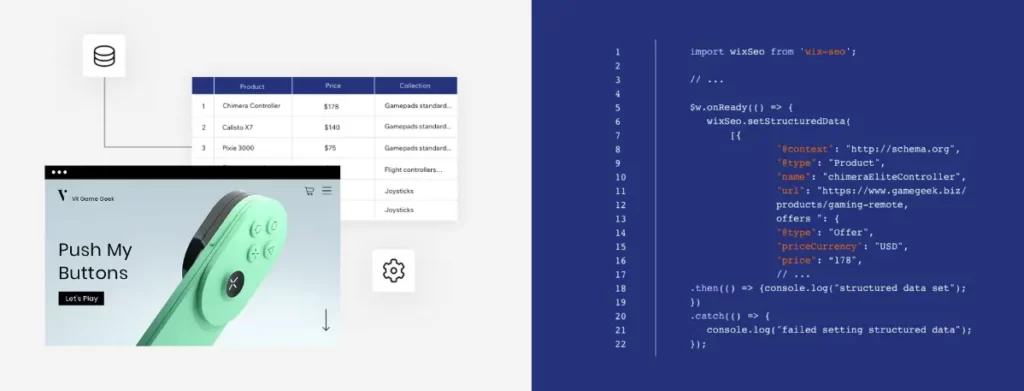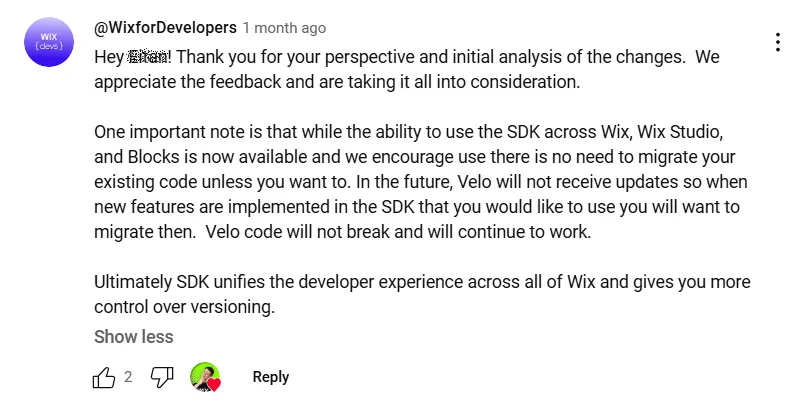Wix is often praised for its user-friendly design tools and quick setup. But what’s really inside? Is it packed with SEO goodness or just sweet on the surface? While Wix delivers plenty of built-in features, the platform’s real SEO potential lies beneath. To get the most out of it, you may need a deeper understanding of technical SEO and development tools, especially if you’re aiming for more than the basics.
At cyberlicious®, we’ve unwrapped every layer of Wix, from its Basic Editor to the chewy center of Velo. And if you’re wondering whether Wix can truly satisfy your SEO sweet tooth (or if you’re better off biting into WordPress), we’ve got the full flavor breakdown below.
Wix SEO in a Nutshell
Wix offers a surprisingly delicious collection of SEO tools for site owners looking to build, optimize, and track performance. And all without having to touch a line of code. From built-in sitemaps and robots.txt customization to a visual SEO Assistant and deep Google integrations, Wix has steadily improved its SEO capabilities over the years.

Its ease of use makes it especially appealing to beginners, but the platform also includes more advanced options through its developer tool, Velo. Here’s a taste of what Wix SEO services offer out of the box:
- Automatic sitemaps
- Canonical tags
- Custom meta tags
- Server-side rendering (SSR)
- Structured data for key page types
- Seamless GSC integration
- IndexNow (for premium sites)
- Keyword research via SEMrush
- URL redirect manager
It even has a direct line to Google Search Console, a feature many other platforms still fumble.
Wix Basic Editor: Easy Peasy, but Limited
The drag-and-drop Basic Editor is designed to help non-techies build beautiful sites fast. And for the most part, it delivers. You can tweak meta tags, add alt text, customize URLs, and even run accessibility audits right from the dashboard.

But when it comes to advanced optimization? You may start to feel the sugar crash. Limitations in the Basic Editor:
- Structured data is mostly preset and is capped at 7,000 characters.
- Large images (over 25MB) must be manually compressed.
- Lazy loading is automatic, but not fully crawl-optimized.
- No granular control over caching, minification, or gzip compression.
- No access to server configurations like .htaccess.
- Cannot create LLMs.txt for AI optimization.
- Fine-tuning SEO settings at scale can be tedious.
Wix does give you automatic caching, WebP conversion, and Core Web Vitals support, but some of it happens behind the scenes without your say-so. Want more control? That’s where Velo steps in.
Velo: A Wix Developer Tool Worth Savoring
Velo is Wix’s open dev platform and is a sweet upgrade for anyone with JavaScript skills. It lets you bypass many of the Basic Editor’s limitations and for those with a technical background, Velo opens up new possibilities.

What you can do with Velo:
- Write frontend + backend code with Node.js (Velo supports Node 14)
- Customize structured data and metadata with code
- Build custom routers and APIs
- Create dynamic content and databases
- Optimize images manually or with third-party APIs
- Add custom lazy loading scripts
- Use functional testing and logging tools
- Secure API keys with Secrets Manager
- Trigger personalized emails based on visitor actions
Since it’s hosted on Wix’s serverless infrastructure, you don’t have to stress about scaling, SSL, or security. Everything is baked in! You can even reuse your favorite Velo-built features as packages across multiple sites. Tasty.
Important Note: Wix is transitioning to a new Wix JavaScript SDK for developing sites and apps, with Velo APIs continuing to function unchanged during this transition period.

Still Sticky: Velo Limitations
While Velo adds some serious flavor to the mix, it can’t do everything. Even with advanced dev tools, Wix is still a closed platform. Here’s what remains off-limits:
- No .htaccess or server-level access
- Cannot set custom response headers (like X-Powered-By)
- No support for LLMs.txt files (used for AI crawling)
- Limited flexibility with image URLs (hosted on Wix servers)
So, if you’re a control freak, and we say that with love, you might feel like someone took away your cookie jar.
Wix vs. WordPress: Which Fits Your SEO Strategy?
Wix is designed to minimize friction and get users online quickly, which Wix website designers and developers appreciate. However, WordPress offers near-total control, making it a treat for developers or marketers with technical SEO experience.
WordPress gives you:
- Full access to source code and server-side configs
- Plugins for everything (Yoast, RankMath, WP Rocket)
- Complete structured data freedom
- Custom headers, redirects, and AI optimizations
Of course, that freedom comes with responsibility. Updates, plugin conflicts, and security patches are all on you. But if you want total SEO freedom, it might be worth rolling up your sleeves.
Which Businesses Benefit Most from Wix vs. WordPress?
Not sure which platform fits your business best? Here’s a quick look at who benefits most from using Wix versus WordPress, based on team size, goals, and technical needs.
| Wix | WordPress |
|---|---|
| New or small businesses looking to launch quickly | Businesses that rely heavily on search visibility or need advanced SEO features |
| Teams without a developer who want easy design and built-in SEO tools | Teams with access to developers (or the budget to hire one) |
| Service providers or creatives who need a clean online presence without ongoing tech maintenance | Brands planning long-term growth, custom functionality, or high content inventory or output |
If you need flexibility, scale, and full control over how your site behaves and performs in search engines, WordPress offers more room to grow. But for straightforward websites with a focus on ease and speed, Wix SEO can be a sweet place to start.
Final Thoughts: Wix SEO Gets You Far, Just Not Everywhere
Wix delivers impressive SEO capabilities for most small to mid-size business needs, especially when paired with the advanced features of Velo. But if you plan to dive deep into structured data, page speed metrics, or scalable SEO workflows, you may want to consult with a developer or prepare to invest time learning the ropes.
So, are Wix sites SEO friendly and the right fit? If your priorities are speed, usability, and SEO-ready defaults, Wix can absolutely support your goals. Especially if you tap into Velo and the right Wix SEO expert. But, if you need full technical control or want to push every performance lever available, WordPress or a custom CMS may be the more strategic choice.
Need help figuring it out? Our team of SEO strategists and developers are happy to guide you. Let’s talk.

